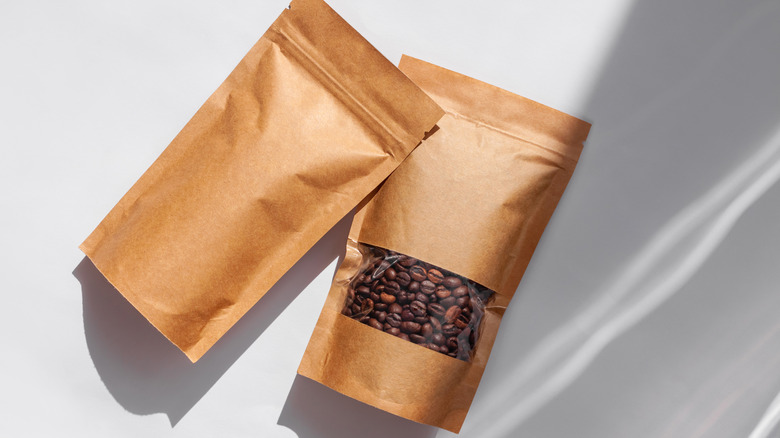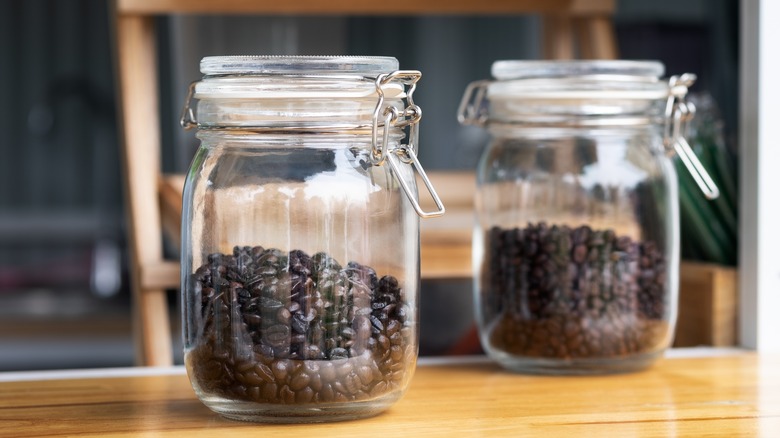The Smell Test To Be Wary Of Before Freezing Coffee Beans
When you rely on a cup of coffee for your morning pick-me-up, it is important to keep your coffee beans fresh. Whether you prepare artisan coffee beans in a French press or enjoy Folger's from a Mr. Coffee, how you store your coffee beans can make or break your morning cup of joe.
Coffee beans lose their freshness quicker than you may think. Whole coffee beans usually stay fresh for one week once opened, and ground beans, which degrade much more quickly, are only good for a few days. Unopened bags of both whole bean and ground coffee have longer shelf lives and could last up to a few months.
Storage methods can also have an impact on the freshness of your coffee, especially if they expose the beans to light, moisture, or other conditions that contribute to their degradation. Coffee beans do not necessarily expire, but they can go stale and lose their flavor and aroma over time. If stored improperly — like in the fridge or freezer — they may even take on some unwanted flavors and aromas.
What is the smell test?
Coffee beans are porous and therefore susceptible to absorbing moisture. When stored in moist conditions, they may also absorb the odor and flavor of things around them. For this reason, many experts advise against storing coffee in refrigerators, which are naturally moist environments.
There is a little bit more debate when it comes to the freezer since proper freezer storage could help coffee last longer. Improper storage, however, could cause the same issue as the refrigerator and result in odor absorption. "If your freezer smells like that rotisserie chicken you froze last week, then that smell will make its way through that barrier and into your coffee," says Dakota Graff, director of Onyx Coffee Lab, via Epicurious.
Open coffee bags, especially the thin paper ones you get at coffee shops or farmers' markets, are rarely airtight, meaning moisture and odor can make their way inside. If you want to store coffee beans in the freezer, your best bet is to transfer them to an airtight container. "Break a big bag out into two-week portions, vacuum seal each two-week portion in a FoodSaver or similar, and freeze," says Aaron MacDougall, founder of Broadsheet Coffee Roasters, via Epicurious. MacDougall advises letting the bag come to room temperature before using it and says to avoid refreezing. And don't forget to sniff before brewing to avoid a rotisserie chicken-flavored cup of coffee.
Other ways to make coffee last longer
While coffee technically can be stored in the freezer, the moisture risk (and potential freezer burn) is not worth it, and there are better ways to preserve its freshness. Several factors impact how fast coffee goes stale: time, moisture, sunlight, oxygen, and ground vs. whole bean.
If the coffee came in a plastic bag with a valve, that is often the best place to keep it. "The best way to store coffee is to store it in the bag it comes in," Erika Vonie, director of coffee at Trade Coffee, says, via Food52. "Most coffee bags are designed with a gas-release valve on them, which does a great job of letting that gas expel without letting air in." If your coffee bag does not come with a valve, or you would prefer to keep it in a different container, make sure the container is airtight and stored in a cool, dark, and dry place.
If all else fails and you are stuck with a stale bag of coffee, don't fret. Stale coffee typically works well when making cold brews. Or, you could always add milk and sugar.


